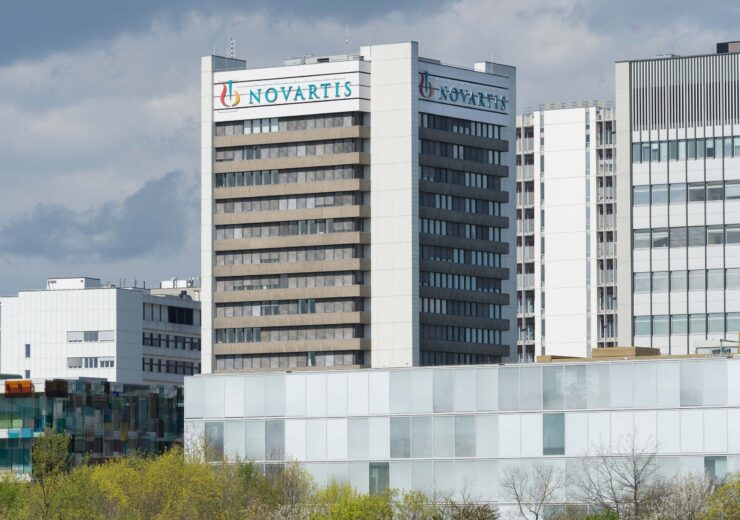Leqvio claimed to be the first and only approved small-interfering RNA (siRNA) low-density lipoprotein cholesterol (LDL-C) lowering treatment in Europe

Novartis tower with surrounding buildings. (Credit: Novartis AG.)
Novartis has secured the European Commission (EC) approval for Leqvio (inclisiran) to treat adults with hypercholesterolemia or mixed dyslipidemia.
Leqvio is an advanced small interfering RNA (siRNA) that offers effective and sustained LDL-C reduction for patients with atherosclerotic cardiovascular disease (ASCVD), ASCVD risk equivalent and heterozygous familial hypercholesterolemia (HeFH).
ASCVD, ASCVD risk equivalent and HeFH are considered as major drivers of heart attacks, strokes, which ultimately leads to death.
The drug differs from other therapies by preventing the production of the target protein in the liver and increases hepatic uptake of LDL-C to clear it from the bloodstream. Leqvio is dosed initially, followed by doses at three months and once every six months.
Novartis has secured the global rights to develop, manufacture and commercialise Leqvio under a license and collaboration agreement with RNAi therapeutics firm Alnylam Pharmaceuticals.
Novartis Pharmaceuticals president Marie-France Tschudin said: “Cardiovascular disease remains the leading cause of mortality in Europe4, which demonstrates the urgent need for innovative treatments for patients struggling to reach their LDL-C goals.
“With Leqvio, we’re proud to bring a first-in-class treatment delivering effective and sustained LDL-C reduction that has the potential to improve outcomes for people living with ASCVD.
“At Novartis, we’re committed to reimagining care for cardiovascular disease by working together with healthcare systems and other stakeholders to explore innovative access models and bend the curve of life for patients.”
EU approval of Leqvio is based on ORION clinical development programme
The regulatory approval is supported by the results from the ORION clinical development programme, which studied Leqvio in patients with elevated LDL-C, despite maximally tolerated statin therapy.
In the trial, treatment using Leqvio showed an effective and sustained low-density lipoprotein cholesterol (LDL-C) reduction of up to 52%.
ORION clinical development programme includes Phase 3, placebo-controlled, double-blind, randomised trials ORION-9, ORION-10, and ORION-11.
In the three clinical trials, patients received Leqvio treatment, as a subcutaneous injection administered by a healthcare professional, and maintained LDL-C reduction throughout each six-month dosing interval.
Phase 3 ORION-9 trial studied the efficacy, safety and tolerability of inclisiran sodium salt 300mg, equivalent to 284mg of Leqvio in 482 participants with clinical or genetic evidence of HeFH and elevated LDL-C.
The treatment showed 48% mean placebo-adjusted change in LDL-C reduction at 17 months and 44% time-adjusted change in LDL-C reductions from three through 18 months, which are the primary endpoints of the study.
The Phase 3 ORION-10 trial evaluated the efficacy, safety and tolerability of inclisiran sodium salt 300mg, equivalent to 284mg of Leqvio, in 1,561 participants with ASCVD and elevated LDL-C, at 145 sites in the US.
ORION-10 showed 52% mean placebo-adjusted change in LDL-C reductions and 54% time-adjusted percentage change in LDL-C reductions, which are the primary endpoints.
Phase 3 ORION-11 study to evaluate the efficacy, safety and tolerability of inclisiran sodium salt 300 mg, equivalent to 284mg of inclisiran, in 1,617 patients with ASCVD or ASCVD-risk equivalents and elevated LDL-C, regardless of statin therapy.
In the study, the treatment showed 50% placebo-adjusted change in LDL-C reductions and 49% time-adjusted LDL-C reductions, which are the primary endpoints of the study.
